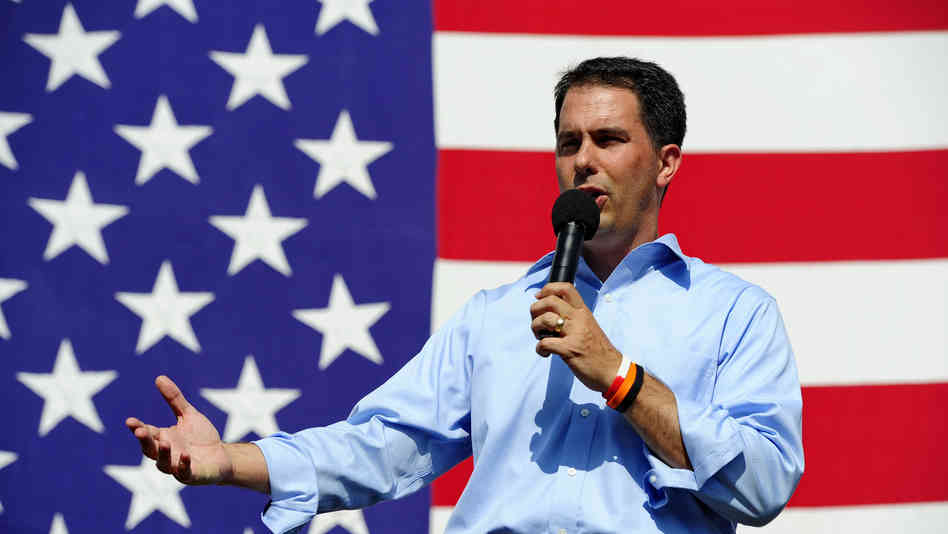[soundcloud url=”https://api.soundcloud.com/tracks/131170745″ params=”color=ff5500&auto_play=false&show_artwork=true” width=”100%” height=”166″ iframe=”true” /]
Videos by Rare
In a Rare interview, the Wisconsin Republican governor Scott Walker talks about the fight in other states and cities taking on big government special interests. He explains how this election year could shift the emphasis to limiting government in many areas of the country on a local level.
Kurt Wallace: Government spending, government employees, and government unions. Taxes and increasing debt continue to plague our US, and many states are struggling. Even Detroit has gone bankrupt, essentially. But what would happen if our elected officials actually did something about the debt before it was too late? Our guest, Governor Scott Walker, is here to discuss. He has a new book, “Unintimidated: A Governor’s Story, and a Nation’s Challenge.” Governor Walker, thanks for being with us today on Rare.
Governor Scott Walker: My pleasure. Glad to be with you.
Kurt Wallace: Your book is about this very subject, and actually doing something to rein in government. Tell us about your story.
Governor Scott Walker: Yeah, it’s interesting. When I first was elected back in 2010, we knew we faced both an economic and a fiscal crisis coming into my term as governor. But the day after the election, we didn’t know quite how big it was until we got into the budget books of our state government. We knew that just cutting things – I believe in smaller government, in fact, and years before I was governor of Wisconsin, I was the Milwaukee county executive, the largest county in the state and I cut the workforce there by about 25% and reduced the debt by about 30%. So I’m all for smaller government, but we also knew what we wanted to do it in a way that wasn’t just about cutting, it wasn’t just about austerity – it was about reform. It was about fundamentally changing things about the state on a local level. And so we had about a $3.6 billion budget deficit. We knew the would have to take on public employees now and at the state level, with the public employee and the big government union bosses at the local level because about half of our state budget is aimed to go to schools and local governments. So we knew to do that, we would have to reduce how much money went to the local governments. But because we still wanted things – the limited amount of government that was necessary to work – we knew we had to change collective bargaining, and with it we had to take on the big government union leaders.
Kurt Wallace: Well, there was a lot of anger that ensued and people broke into the capitol and there was violence that came about after this.
Governor Scott Walker: Yeah, it was amazing. There were, at one point early in 2011, we had as many as 100,000 protesters in and around the capitol. After the first week or so, they came in and literally stayed around. People forget about this, but we were the original “Occupied Movement” in the capital of Madison. After, we ultimately prevailed and moved onto Wall Street and around the country. But it was interesting because it was very telling. It wasn’t just because we were taking on collective bargaining.
Collective bargaining, some people claim, is a right. It’s not a right. It’s an expensive entitlement. And that’s where we really started to change the trend and get the public on our side because we realized out fight wasn’t about rights. It wasn’t about human rights, civil rights, or anything else like that.
These weren’t rights. These were expensive entitlements, so what we were doing was picking between where government had been at the state and local level in the past – which was power being firmly in the hands of the big government. We were looking to go away from that and to put the put the power back in the hands of the hardworking taxpayers. That, probably more than anything, was the biggest threat.
It wasn’t just pension and healthcare costs, obviously – that’s a big part of it – but really what it was about was who was in charge. The icing on the cake for a lot of these folks that penned up all the anger and the outrage was not only a collective bargaining change – taking on the union structure- but also empowering the remaining public employees with the freedom to choose whether or not they wanted to be in a union or not. That’s probably where all the stakes came out – that union leaders from across the country started coming out after the first week to ten days. You had the AFL-CIO, you had the Teamsters, you had the NEA, you had all these different folks coming in from Chicago, Washington, New York, New Jersey, and so forth because they knew that if it could happen in Wisconsin, it could happen anywhere – and it did.
Kurt Wallace: Have other governors or public officials spoken to you about their concerns of actually doing this in their areas, or even nationally?
Governor Scott Walker: Yeah, we’ve had bits and pieces. We’ve had governors, for example, in Tennessee and Idaho and other places do some of the reforms related to education that we did. We’ve had other governors in New Jersey and some other places – and even some mayors – look at the pension reforms. We have yet to see any one state or jurisdiction where they’ve gone quite as far or quite as ***(INAUDIBLE)*** as we have, but I think a lot of that will change even more after this coming November. What I mean by that is that I think people are interested, but reluctant in response to all the protests and the recall I had. We actually won the recall I had despite all the money that was spent nationally against this. It was a very telling sign, not only to the governors, but even to some big city mayors out there who are looking and realizing they need to take these very issues on. But I think the bottom line will be after November because there’s still a good push to take on me, to take on a handful of other governors in Florida, Pennsylvania, Michigan, Ohio. Take Governor Schneider, for example. In Michigan, we spent a lot of time with him last year -a year ago, I should say – helping him (when he was going through ‘Right to Work’ in Michigan) understand how to avoid making some of the mistakes we had done that allowed the capitol to be taken over. In the end, that’s why in Michigan it went through relatively quickly. It didn’t have any of the kind of protest, and it’s now working for the taxpayers in that state as well. So, no one’s been quite as comprehensive as we have, but I would imagine after this coming November’s elections – if they see that we’re elected again by the voters in our state – I would imagine, not only among Republican Governors but maybe even some Democrat mayors, they’ll realize maybe it’s worth taking on these big special interests.
Kurt Wallace: Governor Walker, author of Unintimidated, thank you very much for spending time with us today on Rare.
<
p dir=”ltr”>Governor Scott Walker: My pleasure. Great to be with you.



